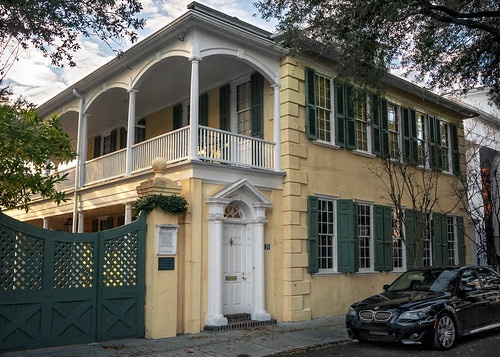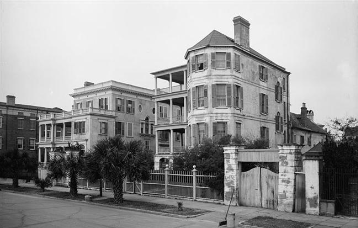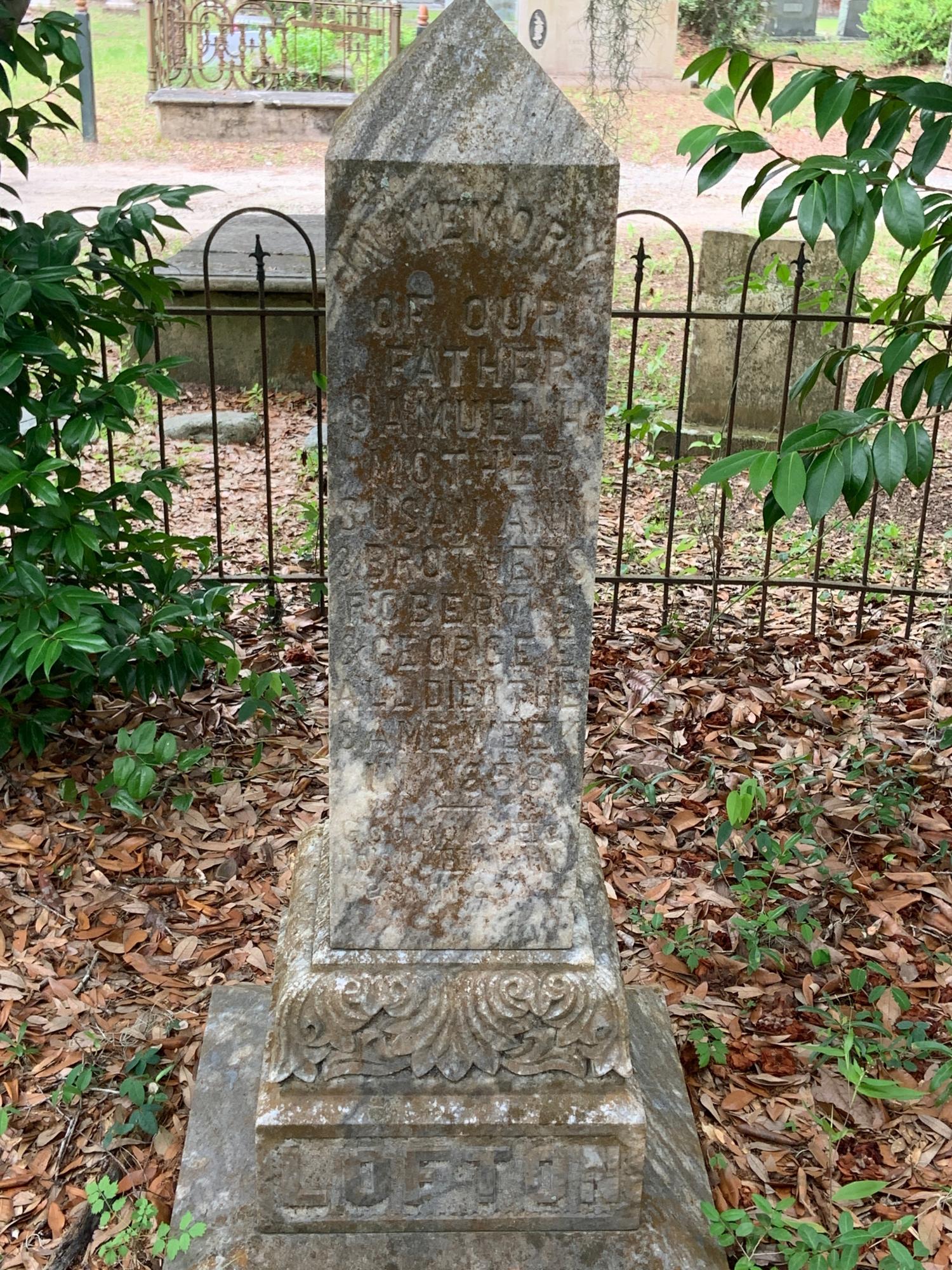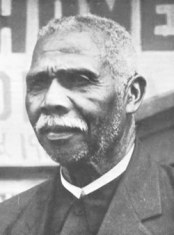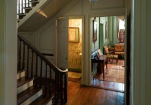



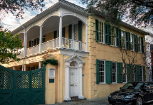

JULY
July 1
1864 -- The Union Army exploded a charge of dynamite in a tunnel that went under Confederate lines at Petersburg, Va., killing many in South Carolina's 24th Regiment. John Marion Lofton, of McClellanville and Mt. Pleasant, was among four Confederate units who responded to the blast and successfully staved off an attempt by 14 Union units to charge through the crater created by the blast. (Source: Home in the Village, p. 78)
July 2
1756 -- News reached Charles Town that England had declared war on France. Royal Gov. Lyttleton received the Assembly's support in raising funds for the war effort by raising taxes on run, bread and flour. Wealthy legislators, however, stopped short of further taxing real and chattel property.
1822 -- Denmark Vesey and others convicted with him of plan a slave rebellion were quietly hanged in the early morning for fear of a riot.
2023 -- Six members of the Magwood family were stabbed to death in Green Pond, then their house set afire. A seventh victim, just 13 years old, was injured, but played dead until the killer left the house, then escaped to a neighbor's house. Among the dead were Maggie Magwood, 101; Amos Magwood, 73, Michelle Wright, 50; Jefferson A. Burnell, 49; Sha-Riya Manigo, 11; and Shamiah Rutledge, 7. Sha-Riya's father, Ryan Lenard Manigo, was arrested and charged. Arrest warrant affidavits said Manigo "entered the residence under the cloak of darkness while armed with a knife, stabbed family members to death ... and set the residence on fire." According to the affidavits, he also sexually assaulted several of the victims. (Source: Post and Courier, Aug. 1)
July 4
1759 -- A committee of the Charles Town Library Society began considering if the money they had raised so far, including pledges, was enough to "encourage one or more Professors of the different branches of learning to settle among them" for the purpose of beginning today's College of Charleston. (Source: A History of the College of Charleston, p. 6)
1906 -- David Doar, one of the last Lowcountry rice planters, was the keynote speaker for the Agricultural Society of St. James Santee, on the occasion of the 200th anniversary of the parish. (Source: Home in the Village, p. 13)
July 5
1732 -- Margaret Johnson, "am amiable, sensible Lady/Of Exemplary Piety, Charity and Oeconomy," according to her memorial stone, and the wife of Proprietary and Royal Gov. Robert Johnson, died. She was buried in St. Philip's churchyard. Unfortunately her stone was destroyed in the fire of 1835.
2023 -- John Patrick O'Brien, a New Jersey native who moved to Charleston, died. In 1943, at the age of 18, O'Brien enlisted in the Army Air Corps and, after training, was assiged to the 27th Troop Carrier Squadron as a Second Lieutenant. In August 1945, O'Brien was on a mission to Mukden, Manchura, to rescue 24 American and Allied Prisoners of War, for which he was awarded the Distrguished Flying Cross. He left active duty in 1946, but served in the Reserve until his retirement at the rank of Major. He always wore his WWII cap in public and appreciated those who thanked him for his service.
July 7
1764 -- Joseph Brown Ladd was born near Newport, R.I.
July 10
1863 -- From their base on Folly Beach, U.S. forces attacked Confederate positions in the southernmost part of Morris island, pushing as far north as Battery Wagner before they had to turn back. Though inconclusive, this attack marked the beginning of the 587-day Siege of Charleston, the longest siege operation of the war.
July 11
1656 -- Mary Fisher Bayley Cross and Ann Austin sailed into Boston Harbor, becoming the first Quakers in British North America.
1863 -- 1,200 Union soldiers ran at the battery head on. Though outnumbered, conditions were in the Confederates’ favor, and they turned back the Union attack with Confederate forces losing only 12 soldiers while 339 Union soldiers were killed, wounded, captured, or missing.
July 12
1758 -- Chief Justice Charles Pinckney died, leaving his wife Eliza a widow at age 35.
1858 -- The Charleston Courier reported that "James Kennedy ... convicted of stealing a gold watch valued at $100 ... sentenced to be imprisoned one week, and then to receive upon the bare back, in the Jail yard, twenty stripes; afterwards to be imprisoned one week, and then discharged." (Source: Abode of Misery, p. 12)
July 13
2023 -- Services were held at Holy Cross cemetery on James Island for Marie Heiterer Townsend. Her family asked friends and family to "Please dress appropriately for the hot Charlestom heat - Granny would want you to wear shorts and short sleeves."
July 14
1781 -- Col. Henry Hampton of State Troops of S.C. seized the Four Hole Swamp Bridge, establishing a post there to check the British troops of Lord Rawdon as he evacuated Orangeburg. (Source: Goose Creek: A Definitive History, Vol. 1, p. 112.)
1822 -- Bastille Day, the date selected for the Denmark Vesey Rebellion.
July 15
1781 -- Patriot Col. Wade Hampton interrupted Sunday morning services at the Goose Creek Parish Church, where he seized some horses and captured a number of attendants, whom he paroled on the condition they not take up arms against Americans in the future. (Source: Goose Creek: A Definitive History, Vol. 1, p. 112.)
1801 -- The Hebrew Orphan Society of Charleston was founded as America’s oldest incorporated Jewish charitable organization.
2023 -- John E. Day, senior engineer and director of maintenance at ALUMAX of SC, a smelting plant near Mt. Holly, passed away. Having joined the company at its inception in 1980, he received global recognition for his leadership in the recovery and startup of the plant after its forced shutdown during Hurricane Hugo in 1989.
Long-time Charleston physician Dr. William Thomason also died on July 15, 2023. During his residency at Walter Reed Hospital, Dr. Thomason flew in Air Force One as part of a team attending President Dwight D. Eisenhower following his 1955 heart attack. Dr. Thomason was a past president of the Charleston County Medical Society, a member of First (Scots) Presbyterian Church, Charleston Rotary Club, Middleton Hunt Club, Surgeon for the Washington Light Infantry, and Battalion Surgeon for the Palmetto Guard. He was also a member of the Society of Colonial Wars, the Sons of the American Revolution, the St. Andrews Society, the Widows and Orpans Society, and the Carolina Yacht Club.
July 17
1954 -- The News & Courier ran an article describing the slow decline of Charleston's famed Mosquito Fleet.
2023 -- Marsha E. Hass, Esq., one of the first group of women to live in a Clemson dormitory, died at the age of 76. Her obit said she was a complex person with great ability and talent who worked in a man's world where she was not afraid to speak her mind. As a Folly Beach magistrate, she let local police know not to bring charges against a prostitute unless they also brought in the john. She spent her later part of her career as a Professor of Business Law at the College of Charleston. She loved to fish and for a while was the only licensed female charter boat captain on the East Coast.
July 18
1863 -- 650 members of the all-black (except for Col. Robert Gould Shaw) 54th Massachusetts Regiment attacked Battery Wagner on Morris Island in one of the bloodiest battles of the Civil War.
July 20
1726 -- John Pight, a registered trader in enslaved Native Americans and owner of 700 acres on the south side of Goose Creek, wrote his will. (Source: The Goose Creek Bridge, p. 53)
July 22
1769 -- The colonial Assembly appointed a Committee of Thirty-Nine, which included an equal number of merchants, planters and artisans, thus for the first time granting the laboring classes a significant voice in the colony's government. (Source: Walter J. Fraser Jr. in Charleston, Charleston!, p.125)
2003 -- Ronald Norris Jr., a former radio operator in the U.S. Marine Corps, died in Summerville. Norris was deployed aboard the USS Iwo Jima in April 1986 to make an amphibious landing on Vieques, a small island off Puerto Rico. The landing was filmed and used in the Clint Eastwood movie Heartbreak Ridge.
July 25
1770 -- Benjamin Smith, former Speaker of the Comons House of Assembly and Vice President of the Charleston Library Society, who realized his death was imminent, added a codicil to his will leaving his trustees 500 pounds sterling "to be by them applied to the erection of the college whenever they see the good work brought to effect." (Source: A History of the College of Charleston, p. 12-13)
July 26
July 27
1864 -- The Charleston Mercury ardently defended Confederate Gen. Jubal Early's plans to utterly sack Northern towns in revenge for the damage done to Southern sites, saying "Let this comfort the tens of thousands of houseless Confederates whose homes have been destroyed by Yankee raiders." (Source: Stolen Charleston, p. 19-20)
July 29
1688 -- Stede Bonnet, Charleston's Gentleman Pirate, was christened at Christ Church Parish in Barbados.
July 30
1865 -- Captain Henry Lofton of McClellanville was hospitalized at General Hospital #4 in Richmond, VA, for "chronic diarrhea and bebility." Disease was the deadliest enemy during the Civil War, accounting for twice as many deaths as wounds in battle, and diarrhea was the most prevalent of all. (Home in the Village, p. 78)
1937 -- The Rev. Daniel Jenkins died.
2023 -- Sam Kirshtein, 98, died. The list of contributions and leadership roles Sam held during his lifetime took up an entire column in the July 31 Post and Courier. A lifelong Charlestonian, he was an active alumnus and athletic supporter of the College of Charleston. He was a local business leader through his ownership of Charleston's oldest extant furniture store, Dixie Furniture, a long-time anchor of upper King Street before upper King Street became cool. A generation of Charlestonians will remember its advertising slogan, "Dixie'll do it, 'cause Dixie dooooooon't care!" Sam and his wife Mitzi also were active in Charleston's Jewish community. Gov. Mark Sanford awarded Sam the state's highest civilian honor, the Order of the Palmetto, in 2005 for the many ways he made a difference in his community. He was one of the happiest, nicest guys I ever met, and made me immediately feel at home when, as President of the C of C Alumni Association, he welcomed me to its board in 1998.
